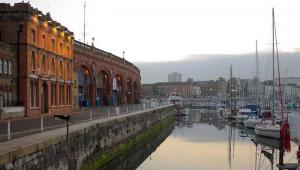11 November 2008
When the going gets tough, the tough invent a grand-sounding body. Philip Johnston asks whether Gordon Brown's new economic 'war council' is a lean, mean fighting machine or a toothless gimmick?
You have to be over a certain age to remember Neddy. Not the character in the Goons, but the National Economic Development Council, aka NEDC, or more familiarly, Neddy. Prime Minister Gordon Brown is just about old enough to recall it, and as an economic historian will certainly know of its existence and be well aware of its fate.
Neddy stalked the land the last time a Labour government had its hands firmly on the levers of economic power, although it was, in fact, set up by the Conservative government of Harold Macmillan in 1962. Its principal function was to co-ordinate the general direction of economic policy between government and industry. It was designed to steer Britain away from what was then called 'stop-go' (a forerunner of 'boom-bust', and a dragon that was just as unslayable) and to ensure stable growth.
The recent crash has put paid to Labour suggestions that the laws of the economic cycle had somehow been suspended; the new mantra is that it is all the fault of 'global' conditions. At a recent – and somewhat belated – attempt by Parliament to point the finger of blame, MPs on the Treasury select committee found that 'sorry' was a word that did not easily pass the lips of the principal players. In the 1960s, similar worries led to a belief that direction from the centre was the answer, though within a few years, Neddy was moribund as the economy lurched from one crisis to another, culminating in the 1967 devaluation and the long economic decline that was not arrested until the mid-1980s.
Given these inauspicious antecedents, it was somewhat alarming to see the shattered remnants of Neddy crawl from the wreckage of the great financial crisis of 2008, like the arm of the android in the closing scenes of The Terminator. Once again we have a National Economic Council, which Gordon Brown has established in response to the credit crunch. It differs in one important respect from the NEDC in that it is essentially a Cabinet committee by another name and does not have policy-making autonomy. It was such aggrandisement that sounded the death knell for Neddy in the 1960s. The politicians resented the way leading industrialists tried to use it to increase their influence over economic policy. Employers, for their part, were worried that the NEDC would be used by future governments as the basis for more dirigiste economic planning, of the sort favoured by former economic affairs secretary and deputy leader of the Labour Party, George Brown, and which Labour embraced in the 1970s.
To sustain the movie metaphor, there is a back to the future feel about Brown's Whitehall ravamp. On one level, the new economic 'war council' is something of a gimmick, a device that allows the government to maintain that its response to extraordinary circumstances is appropriately grand. A Cabinet committee already existed to co-ordinate economic policy, chaired by the prime minister, which the new body has replaced. But the worries that employers voiced 40 years ago – that it could morph into something far more interventionist and 'big statist' – remain valid.
Brown believes the council offers the opportunity to develop 'a new approach to co-ordinating economic policies across government'. Like the NEDC, it will take advice from outside experts from across different sectors of the economy and have a strong regional input with links to a new Regional Economic Council, 'to ensure that the issues and concerns of each region are heard and acted upon across government'.
In another very 1960s touch, regional ministers will meet regularly with the chairs of regional development agencies and representatives of business and trade unions. A separate council made up of the regional ministers will meet weekly, chaired by Liam Byrne, chancellor of the Duchy of Lancaster. The council is served by a senior officials' working group, chaired jointly by the Cabinet secretary, Sir Gus O'Donnell, and the permanent secretary at the Treasury, Nicholas Macpherson. Senior staff from the Cabinet Office and the Treasury comprise the secretariat to provide the analysis and papers for consideration by the council and the working group.
The National Economic Council ranks as a full Cabinet committee, with the prime minister, the chancellor, business ministers Peter Mandelson and Shriti Vadera and all the major departments on board. But it also includes business people who have been given peerages. Among them is Lord Myners, a City veteran and former chair of Marks & Spencer, who is charged with repairing the government's relationship with the Square Mile and assisting efforts to bring the financial services industry under control. Lord (Stephen) Carter, a former chief executive of Ofcom and Brunswick PR agency, had been brought into sharpen the Downing Street message but now finds himself in the government as minister for communications, technology and broadcasting.
This council is a very Brownian construction, a complex piece of Whitehall machinery that has plenty of levers but no guarantee that when one is pulled anything happens. Why, indeed, should son of Neddy be any more successful than its long-buried forefather?
Its birth was equally messy, with the same Whitehall turf war raging that led to the demise of the NEDC in the 1960s. The Treasury was mightily miffed then and is again today at this incursion on its territory. Just as George Brown's somewhat nebulous DEA spent much of its time locked in mortal combat with the Treasury (which Brown lost) so there has been a furious battle over who determines economic policy.
This time, another economic crisis has tempted Number 10 to try to muscle in once more – hardly surprising given the prime minister's own lengthy tenure as chancellor. He wanted closer policy co-ordination while the Treasury resisted any diminution in its control of major taxation and financial decisions. The outcome was that the council, despite being set up in response to the banking crash, will have no role in determining financial stability issues. These will continue to be addressed through the existing standing tripartite arrangements – the Treasury, the Bank of England and the Financial Services Authority. Pre-Budget and Budget decisions will remain the preserve of the Treasury with no input from the new council. So a body ostensibly established as a response to the financial crisis has absolutely nothing to do with fiscal or financial policy.
'It will work to help people and businesses to deal with the current economic uncertainties,' said Number 10. 'It will co-ordinate efforts to help families deal with higher food and energy prices as we work with our international partners in managing the world's scarce natural resources, and provide the forum on how to equip the country for the future by making the right investments in education, skills, science and infrastructure.'
The 19-strong council meets twice a week and its deliberations so far have resulted less in big picture announcements than micro-managerial decisions, such as action to ease the cash flow difficulties faced by small and medium-sized businesses and to improve the working of the labour market. The council is also looking at how to help business by phasing in new regulations more slowly. Measures to stimulate the housing market and ease energy fears are in the pipeline and it is also charged with considering the latest developments in global commodity markets and their impact on the UK economy.
Brown said he was seeking 'to reconstruct the way we govern to meet the new challenges coming from financial instability, oil price rises [and] food shortages and by making the right investments in science and technology. We need to have a sharper focus on all these areas'. He also predicted that every major government would reconstruct their ways of working in a similar fashion over the next few months.
But however grandiose its provenance, it is evident that the council is not in the business of macro-economic decision making. Where that is concerned, the Treasury and the Bank remain in charge. And since they were jointly responsible for the loose credit policy that led Britain into the greatest borrowing splurge in its history and the highest levels of personal indebtedness in the world – higher even than in the US – one must wonder at the wisdom of letting them sort out the mess partly of their own creation, at least while the same people remain in control.
Getting these people to justify their past actions and indicate a way forward took an unconscionably long time. The conflagration on the world's financial markets raged while Parliament was on its summer vacation and there was no attempt to recall it. Even when MPs returned, there was a peculiar disjunction between the scale of the crisis and Parliament's supine response. In the US, Congress rapidly held those deemed culpable very publicly to account. Only on November 3 did the principal protagonists, Chancellor Alistair Darling, Bank of England Governor Mervyn King and FSA chair Lord Turner, face the Treasury select committee. The questions were submitted by members of the public in a innovative piece of direct democracy. They evinced the sheer bemusement of the entire nation that neither the Bank, nor the Treasury nor the FSA would accept any blame for so great a crisis inflicted upon the British banking system that it had to be part-privatised to avert its collapse.
Darling did not feel his responsibility was that great. 'There are several levels of responsibility,' he said. 'Yes, in our national regulators; undoubtedly we needed to toughen up what was happening internationally. There is another area which we overlook at our peril and that is the responsibility of boards of banks, who are supposed to be the first line of defence in relation to their own institution. Yes, we have to look at what governments are responsible for. We also have to ask ourselves how we ensure that in future banks actually know what they are doing, not just at a senior level but at middle management and so on.'
Perhaps so. Yet the regulators have revived a world which we all thought had been left behind many years ago – a more centrally-controlled economy, and even a financial sector that is partly run from Whitehall, something that Labour in the 1960s and 1970s only dreamt about. Even the arm's-length nature of the Treasury's involvement cannot detract from the fact that its representatives sit on the boards of two high-street banks.
The National Economic Council is a symbol of this new dispensation, even if it might be a damp squib. It also institutionalises a political dilemma for the Conservatives, who have been unable to articulate their supporters' concerns about this creeping socialisation of the economy. Just as Brown and Darling are extolling the virtues of Keynesianism, the Conservatives have proposed establishing an Office for Budget Responsibility to stop governments running up excessive debts.
They have also been busily devising policies that emphasise less state control, more individual responsibility, greater local decision-making, tax cuts when growth allows and reductions in public spending. Yet we could be entering an era where the helping hand of the state is welcomed by people who are fearful for their future and blame the excesses of untrammelled capitalism for the fix they are in.
At his conference in Birmingham, Conservative leader David Cameron said: 'This is the end for the big-spending, big-taxing, recklessly borrowing, big, bossy, interfering government that promises so much and delivers so little.' Actually, it might just be its beginning.
Philip Johnston is assistant editor of the Daily Telegraph
PFnov2008


















